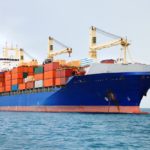The Office of the U.S. Trade Representative took targeted action to restore American shipbuilding and address China’s unreasonable acts, policies, and practices to dominate maritime, logistics, and shipbuilding sectors. These actions come after a year-long Section 301 investigation.
“Ships and shipping are vital to American economic security and the free flow of commerce,” says USTR Jamieson Greer. “Our actions here will begin to reverse Chinese dominance, address threats to the U.S. supply chain, and send a demand signal for U.S.-built ships.”
The actions will occur in two phases. For the first 180 days, applicable fees will be set at $0. After that, fees on vessel owners and operators of China-based vessels on net tonnage per U.S. voyage will increase exponentially over the following years. Fees on operators of Chinese-built ships based on net tonnage or containers will increase incrementally in the following years.
Actions also include incentivizing U.S.-built liquefied natural gas vessels.
“Our concern all along has been that any fees placed on Chinese vessels could be passed on to American farmers who rely on those ships to export corn,” says National Corn Growers Association President Kenneth Hartman, Jr. “While we are still working to understand how this new version will impact the corn industry, we believe this final action is more workable than the initial deal.”
The U.S. Grains Council says the notice from USTR will allow most U.S. grain and co-product exports to continue without added costs on Chinese-built but not Chinese-operated bulk vessels.
“After a year-long investigation, this decision was made with the best interest of U.S. grain producers in mind,” says Ryan LeGrand, USGC President and CEO.





